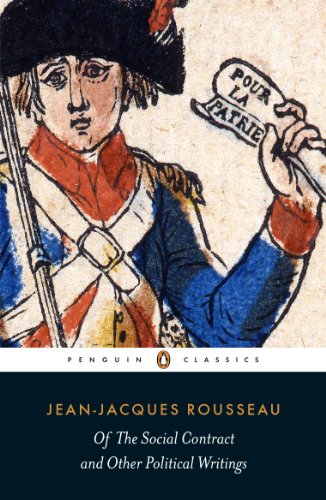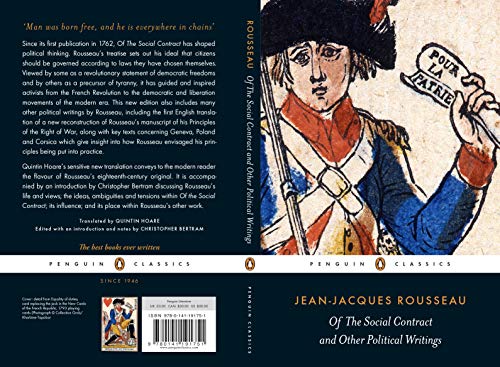Hey everyone! Today, I’m bringing you a review of ‘The Social Contract’ by Jean-Jacques Rousseau. This isn’t just any old dusty philosophy book; it’s got some intriguing ideas that still matter today. Whether you’re curious about where political power comes from, how we balance personal freedoms, or the mysterious General Will (trust me, it’s not just a pizza topping debate), Rousseau’s got you covered. Of course, it’s not all sunshine and rainbows—there are a few hiccups too. Let’s get into it!
In a nutshell
Jean-Jacques Rousseau’s ‘The Social Contract’ is a classic work of political philosophy. It dives into the origins of political authority and explores themes such as freedom, the role of laws, and the General Will. The book is a must-read for anyone interested in how society works and the balance between individual freedom and social order. And don’t worry, no spoilers here!
Origins of Political Authority
Once upon a time in the land of ideas, people kept asking, ‘Who’s the boss around here?’ Turns out, they needed a system to keep things in order. That’s where the whole concept of political authority came from. It’s like needing a referee in a soccer game – someone to blow the whistle when things get out of hand.
Enter the social contract. This idea, brought to life by philosopher Jean-Jacques Rousseau, is like an ancient handshake deal between the people and their rulers. The people agree to give up some of their freedom in exchange for protection and order. Rousseau’s theory was that political authority wasn’t just about power but about fairness and the general good. Think of it like everyone pitching in for a pizza to share, rather than one person hoarding all the cheese.
Of course, the social contract isn’t without its critics. Some argue that it’s an imaginary agreement that doesn’t reflect real-world dynamics. Others say it assumes that all parties involved have equal power, which, let’s be honest, is rarely the case. Imagine playing Monopoly where one player starts with all the railroads—kinda unfair, right?
Despite its flaws, the social contract remains a cornerstone in understanding political authority. It’s the reason we have governments and laws, instead of just a free-for-all where the biggest guy calls the shots. Next up, we will explore the intriguing concept of the General Will. Stay tuned!
Understanding the Concept of General Will in Rousseau’s Social Contract
Oh, General Will, you tricky rascal! Jean-Jacques Rousseau introduced this idea in his book, The Social Contract. He claimed that a community’s collective desire, what he called the ‘general will’, should shape the laws and decisions of the state. Now, don’t be fooled. It sounds like something you’d find in a superhero comic, but it’s far more complex and intriguing.
Rousseau believed that the general will represents the common good or the collective interest of all citizens. Unlike individual will, which can be selfish and narrow, the general will aims at the common welfare. To put it in my own quirky way: Imagine you and your friends are deciding on a pizza topping. You might want pineapple—yes, some people do—but the group leans toward pepperoni. The pepperoni, according to Rousseau, is the general will. It serves the majority’s interest though it might not be your first pick.
Rousseau used this idea to argue that laws should reflect the general will, making us a part of something larger and ensuring justice for all. But here’s the hitch: figuring out what that general will is can be as tricky as untangling earphones! The danger lies in assuming that the government always knows best, which could lead to the suppression of individual voices. It’s a fine balance, much like eating just one slice of pizza when you’re starving.
Now, before you get too wrapped up in ideas of pizza and government, let’s not forget the importance of individual freedom.
The Role of Individual Freedom in ‘The Social Contract’
In ‘The Social Contract’, Jean-Jacques Rousseau gets all philosophical about individual freedom. Now, don’t get me wrong. He isn’t just talking about the kind of freedom you feel when you can stay in pajamas all day. He’s talking about real freedom within society. Picture this: we’re all just a bunch of kids on a playground. If everyone does whatever they want, chaos ensues. Swings get hogged, sand is thrown; it’s a mess. Rousseau says, ‘Hey, let’s agree on some rules so everyone can have fun!’
Cue the social contract. By agreeing to follow certain rules, we give up some personal freedoms but gain the freedom to play nice together. Rousseau believes that this agreement is key to true individual freedom. It’s like opting for a Netflix subscription. Sure, you pay a bit each month, but then you enjoy endless streaming.
While he paints a rosy picture, there are flaws. The balance between personal freedom and societal rules is tricky. You might feel like you’re stuck watching romantic comedies because the majority voted for them, and all you wanted was an action flick. Rousseau’s idea of individual freedom is a bit idealistic. It doesn’t always consider minority views.
That being said, it’s fascinating to think about how our freedoms are negotiated. Are we really free if we live without rules, or do we need boundaries to actually enjoy freedom? Rousseau’s take makes you ponder while sipping your morning coffee.
In the next section, we’ll delve into the social contract implications today. Buckle up; it gets even more relevant.
Social Contract Implications Today
Guess what? Rousseau’s The Social Contract is still a hot topic today. It’s like finding out your childhood snack is now gluten-free. Mind-blowing! You might not think a book from 1762 has any relevance, but, oh boy, does it ever. The social contract is that invisible thread tying us all together, even when we’re arguing about Wi-Fi passwords.
In today’s world of social media drama and political tweets that make you question the universe, Rousseau’s idea of the social contract rings true. It helps us understand how we give up certain freedoms to live in a society where we don’t have to dodge swords or fend off wild animals just to grab a latte.
Think about taxes. Yeah, they’re a pain, but they fund schools, roads, and the park where your dog pretends to be the next Usain Bolt. The social contract is about making those sacrifices for the greater good. Some days it feels like a raw deal, but other days you’re glad you have fire departments and traffic lights. Could you imagine the chaos without them?
Of course, there are downsides. The social contract can be misused by those in power, leading to corruption and inequality. But it also offers a framework to fight against those very issues. Pretty neat, huh?
So, would I recommend reading The Social Contract? Absolutely. It’s like understanding why your favorite video game has rules. It might not change your life, but it’ll give you some food for thought—and maybe even a few conversation starters at awkward family gatherings.
Conclusion
So, wrapping up this review of ‘The Social Contract’ by Jean-Jacques Rousseau, I’d say it’s a mixed bag. On one hand, it’s like having a deep chat with a wise old philosopher who has seen it all. On the other, some parts may feel like you’re stuck in a lecture you didn’t sign up for. The ideas on political authority, individual freedom, and the General Will are still super relevant today. You’ll find yourself thinking about how these concepts play out in the real world, maybe even while choosing pizza toppings with friends. Just prepare yourself for some dense reading and a dash of 18th-century flair. Give it a read if you’re into political philosophy or just want to sound smart at parties. And hey, even if you don’t become an expert on social contracts, at least you’ll have a fancy book on your shelf!



